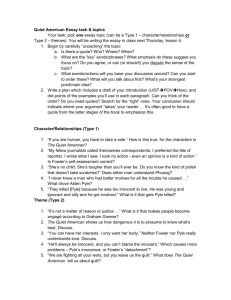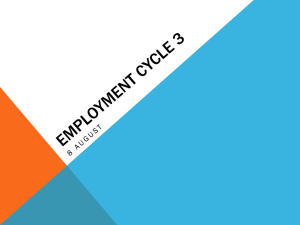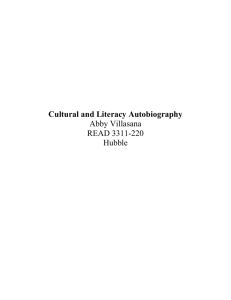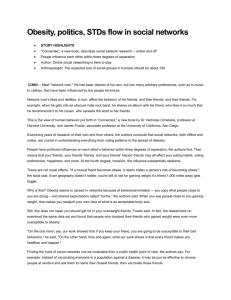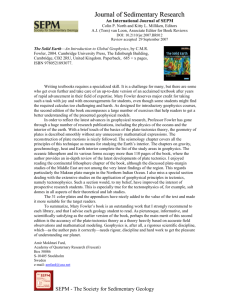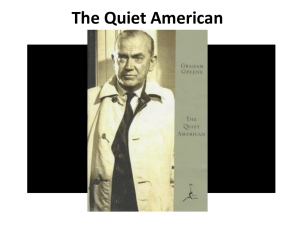The Quiet American
advertisement
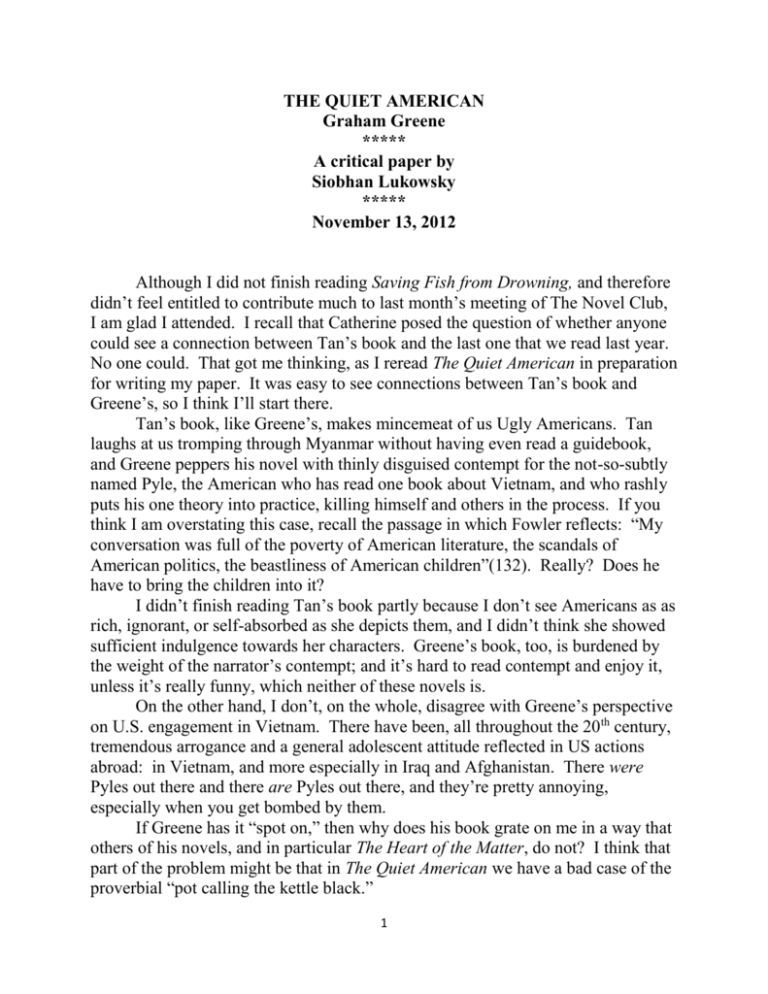
THE QUIET AMERICAN Graham Greene ***** A critical paper by Siobhan Lukowsky ***** November 13, 2012 Although I did not finish reading Saving Fish from Drowning, and therefore didn’t feel entitled to contribute much to last month’s meeting of The Novel Club, I am glad I attended. I recall that Catherine posed the question of whether anyone could see a connection between Tan’s book and the last one that we read last year. No one could. That got me thinking, as I reread The Quiet American in preparation for writing my paper. It was easy to see connections between Tan’s book and Greene’s, so I think I’ll start there. Tan’s book, like Greene’s, makes mincemeat of us Ugly Americans. Tan laughs at us tromping through Myanmar without having even read a guidebook, and Greene peppers his novel with thinly disguised contempt for the not-so-subtly named Pyle, the American who has read one book about Vietnam, and who rashly puts his one theory into practice, killing himself and others in the process. If you think I am overstating this case, recall the passage in which Fowler reflects: “My conversation was full of the poverty of American literature, the scandals of American politics, the beastliness of American children”(132). Really? Does he have to bring the children into it? I didn’t finish reading Tan’s book partly because I don’t see Americans as as rich, ignorant, or self-absorbed as she depicts them, and I didn’t think she showed sufficient indulgence towards her characters. Greene’s book, too, is burdened by the weight of the narrator’s contempt; and it’s hard to read contempt and enjoy it, unless it’s really funny, which neither of these novels is. On the other hand, I don’t, on the whole, disagree with Greene’s perspective on U.S. engagement in Vietnam. There have been, all throughout the 20 th century, tremendous arrogance and a general adolescent attitude reflected in US actions abroad: in Vietnam, and more especially in Iraq and Afghanistan. There were Pyles out there and there are Pyles out there, and they’re pretty annoying, especially when you get bombed by them. If Greene has it “spot on,” then why does his book grate on me in a way that others of his novels, and in particular The Heart of the Matter, do not? I think that part of the problem might be that in The Quiet American we have a bad case of the proverbial “pot calling the kettle black.” 1 In The Heart of the Matter, each character is a disaster in his or her own way. It’s a true novel’s novel. All the characters, even the women, are well-drawn specificities suffering from some version of loss. Louise, the faded book-lover who gives her errant husband a nickname he doesn’t like, is someone we can care about and even identify with. Scobie, the policeman who falls in love with a much younger woman, is pitiable without being cloying. In contrast to The Heart of the Matter, The Quiet American is inhabited by three cartoon characters—Phuong, the Asian child-bride; Pyle, the American ignoramus, and Fowler, the objective journalist. Yes, I know, Fowler has an opium habit, and that is supposed to “fill him out,” if you will, but somehow even that slide into depravity gets captured by his “just the facts, ma’am,” characterization. Think of the passage in which a minor character, Mr. Heng, describes Fowler as follows: “Mr. Fowler, you are English. You are neutral. You have been fair to all of us. You can sympathize if some of us feel strongly on whatever side” (120). This projection of neutrality and objectivity onto the English, and the concurrent portrayal of non-Westerners as variously childlike, savage, ignorant, irrational, ruled by instincts, etc, is of course part of a long tradition of warped thought. Generally known as “Orientalism,” its presence in this novel significantly limits the work’s potential for aesthetic achievement. I’m sure that we all felt a bit uncomfortable with passages such as this interchange between Pyle and Fowler, with Pyle starting, “but she loves you, doesn’t she?” and Fowler responding: “Not like that. It isn’t in their nature. You’ll find that out. It’s a cliché to call them children—but there’s one thing that is childish. They love you in return for the kindness, security, the presents you give them …” but not, it can be implied for the “higher” reasons only a cultivated westerner could understand. Or, in another exchange, “Love’s a Western word … We use it for sentimental reasons or to cover up an obsession with one woman. These people don’t suffer from obsessions.” (124) As should be clear from these passages, Fowler is guilty of the same crime of which he accuses Pyle—misreading his environment due to a highly-inflated sense of self. Is there anything worse than a narrator who describes himself as “neutral,” a reporter who defines his job as to “expose and record,” who says of himself “I was a reporter; I had no real opinions about anything” and then proceeds to populate his “objectively-rendered” environment with Vietnamese who are repeatedly compared to animals, and whose language sounds like the twitter of birds. Fowler relates: “I walked home and up on my landing the old women burst into their twitter of the hedges which I could understand no more than the gossip of the birds.” Wouldn’t it be a better novel if he had, at that moment, said to himself, “hmmn, maybe since I live here and all I might try to actually learn their language. Then their speech wouldn’t sound like birdsong anymore.” But Fowler thinks no 2 such thing, and I don’t believe Greene did either. Of Phuong, Fowler confidently states: “she’ll suffer from childbirth and hunger and cold and rheumatism but she’ll never suffer like we do from thoughts, obsessions.” For Fowler, the Vietnamese are bodies, not minds; they lack the only thing that truly matters—the spiritual dimension. It is fast work to see through Fowler’s mask of objectivity, too easy to perform what literary types in the academy call (or used to call) a “deconstruction” of The Quiet American. The book yields too easily to attempts to show that what is presented as stable, central and authoritative, the Fowler outlook, rests on a set of assumptions and beliefs about Asia that are nauseatingly 19th century. Like the Orientalist attitude of the narrator, the love triangle between Pyle, Phuong and Fowler sits squarely within conventional tropes, and begs to be deconstructed. The surface conflict—two men fighting over one woman— upends itself effortlessly to reveal its subtext: it is the relationship between the two men that gives the book its lifeblood; Phuong is just a placeholder. In my view, this book is much more about Fowler and Pyle than about the superficially drawn Vietnamese cliché whom they profess to love. This is why the best part of the book, the section where it really lives, is the tower breakdown scene and the subsequent hiding-in-the-rice-paddy part. Much has been made, quite appropriately, of the filmic quality of Greene’s novels. That is, many of them have a screenplay feel, and it’s no surprise that Greene actually wrote B movie screenplays. For me, it is in the tower scene that Greene moves out of screenplay territory and into the territory of high art. That is, he ascends out of cliché and into well-paced realism. He surprises the reader with the intimacy he is able to convey between Fowler and Pyle as the two limp like “awkward contestants in a three-legged race” from the foot of the ladder to the rice paddy. Overall, though, as must be obvious by now, in my view, most of The Quiet American misses the mark. It does so because, as I’ve discussed, the author falls victim to his non-nuanced contempt for “Americans,” as well as to his typically Orientalist outlook on “Asians.” These stereotypes mean the writer is unable, or unwilling, to fully imagine an inner life for Pyle and Phuong, and these shortcomings limit the scope and impact of his novel. I hate to say another negative thing, but in my view, The Quiet American would also be a better work if it did not try to integrate, unsuccessfully, the religious themes that so appropriately come in to many of his other works. It would be easy to argue that religion plays such a minor role here as to be unworthy of mention. But I feel differently. My view is that references to Catholicism come in rather frequently, and that when they do; they are not justified by the plot, the setting, or the characterization. They are not part of the heart of the story; they are ancillary, airlifted in, nonessential, and they don’t belong. I am not saying that 3 Greene is insincere in his attempts to incorporate a spiritual dimension into the work; I just do not feel that these attempts succeed. When Fowler says of Pyle’s role model, York Harding, “He’s a superior sort of journalist—He gets hold of an idea and then alters every situation to fit the idea” (160) he could be writing of Greene’s idea of Catholicism, and its ubiquity in his novels. Consider, for example, the way in which his description of the minor character Dominguez is undermined by the narrator’s insertion of Catholicism into the mix: “Now that he was ill I realized how much I owed him—why, he would even see that my car was full of petrol, and yet never once had he encroached on my private life. I believe he was a Roman Catholic” (113). An otherwise admirable description of the policeman Vigot ends on a similar note: “He stopped talking and leant back in his chair, staring at his glass. I had a sense that some analogy had struck him and he was miles away in thought. A fly crawled over the back of his hand and he did not brush it away—any more than Dominguez would have done. I had the feeling of some force immobile and profound. For all I knew, he might have been praying.” (162) The scene between Vigot and Fowler in which this passage occurs is in fact peppered with references to religion which are not justified by the plot or characters. Vigot says to Fowler: “You don’t follow your own principles, Fowler. You’re engage like the rest of us.” And Fowler responds, incongruously, “not in religion” (130). Later, Fowler asks Vigot: “What made you into a policeman, Vigot?” Vigot mentions, in a secular sort of way, that there were a number of factors, and Fowler puzzlingly responds: “Perhaps you ought to have been a priest” (131). The scene between the American journalist Granger and Fowler provides another example of Greene’s, to my mind, awkward attempts to integrate Catholic themes into this novel. Granger has just received news that his son has contracted polio, and naturally he is upset. But for me, this does not make it axiomatic that belief in God must be discussed. Granger laments: “’I don’t mind if he’s crippled, Fowler. Not if he lives. Me, I’d be no good crippled, but he’s got brains. Do you know what I’ve been doing in there while that bastard was singing? I was praying. I thought maybe if God wanted a life he could take mine.’ ‘Do you believe in a God then?’” [says Fowler], “‘I wish I did’” Granger replies (177). At this point, I as the reader need to step back, and ask why this scene is in the novel anyway. It seems superfluous, B movie material, and if I were a devout Catholic I think I might be put off by Greene’s sentimentality, rather than reassured. Fowler’s wife’s refusal to divorce him on religious grounds feels like one more false sound in this one-note symphony. She writes: “What’s the good of arguing with you, or trying to make you see reason? It’s easier to act as my faith tells me to act—as you think unreasonably—and simply to write: I don’t believe in divorce: my religion forbids it, and so the answer, Thomas, is no—no” (110). I 4 feel cheated by this rationale—I’d like to know more about this woman and her obviously self-destructive attachment to Fowler, but Greene does not take me there. The novel ends on a religious note, of course, and once again I get the sense that Greene is just coloring inside the lines, taking refuge in the simple notion that Fowler could be “saved” if he would just “believe.” The last sentence reads: “Everything had gone right with me since he [Pyle] had died, but how I wished there existed someone to whom I could say that I was sorry” (180). I just don’t feel it. Fowler is a depraved opium addict who loves a younger woman, he is not Martin Luther. I wish that Greene had followed Fowler into his specificities, and shown us his dark side in greater detail. 5
